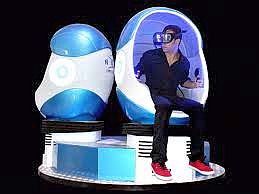Author: Tuong Huy Nguyen, principal research analyst at Gartner.
The 2018 movie blockbuster “Ready Player One” takes place in 2045. Life is not good for the majority of the population, so they tend to spend their time in a virtual reality (VR). Although no one wishes for the catastrophic geopolitical and societal situation the movie depicts, many organizations are looking to recreate the VR experience in real life.
Enterprises already use immersive technologies, such as augmented reality (AR), mixed reality (MR) and virtual reality. However, Gartner expects it will take 5 to 10 years before these technologies reach a mature level. Businesses already experiment with VR, but hesitate to fully commit. On the other hand, customers are fascinated by the new entertainment possibilities, but do not want to invest in head-mounted displays (HMDs) as long as the offering is so small. This is going to change during the next five years.
To keep pace with consumer interest and leverage the opportunities of immersive technologies, organizations must address three main challenges in AR and VR hardware and technology.
Challenge No. 1: 3D design interface
The biggest barrier to wide adoption of immersive technologies is the lack of good user experience design. 3D interface design is difficult and expensive, and there are few people with the necessary design skills to overcome these issues.
The main goal of user experience design is to get users to just don their HMD and go to work. “However, this is not solely a design challenge. Challenges such as eye strain and sound disorientation need to be overcome. Nobody wants to buy a device or an experience that gives you a headache.”
Challenge No. 2: VR is missing two key technology elements for mass adoption
 Although VR is already available to consumers through devices such as HTC Vive, Oculus Rift, Sony PlayStation VR or Samsung Gear VR, it has still not moved beyond a niche market. To enter the mainstream, VR hardware needs to incorporate two important features: convenience and control.
Although VR is already available to consumers through devices such as HTC Vive, Oculus Rift, Sony PlayStation VR or Samsung Gear VR, it has still not moved beyond a niche market. To enter the mainstream, VR hardware needs to incorporate two important features: convenience and control.
Convenience means both availability and access. Availability means there must be a lot of choices, while accessibility is tied to cost and functionality, meaning the hardware and underlying technology must be easy to use and available at an affordable price point. We expect that smartphone and mobile VR will offer an adequate experience at an affordable price that will complement the more high-end HMDs.
Control means agency. At the moment, not all VR devices offer the immersive experience the user expects. There are still many challenges with gesture and movement control.
Challenge No. 3: Smartphone competition
 Despite user-experience limitations, smartphone convenience and developer familiarity means that smartphone AR will establish an early strong foothold in the market. The hardware is already widespread and has a strong developer base.
Despite user-experience limitations, smartphone convenience and developer familiarity means that smartphone AR will establish an early strong foothold in the market. The hardware is already widespread and has a strong developer base.
A handheld smartphone AR can deliver good experiences today, but will prove inconvenient moving forward. Users do not want to locate their phone and then hold it at eye height for extended periods of time. A hands-free AR HMD experience will make the experience much more comfortable, and Gartner predicts that AR HMDs will come to market in significant volumes only after 2020.
AR in the enterprise, however, will see some early successes and gain traction more quickly than general consumer AR. These solutions will be purpose-built to address a business need such as the ability to draw on a screen or moving image during a remote meeting or presentation, architectural walkthroughs, or be used in controlled environments where devices need industrial certification or device resilience.
These use-specific HMDs will be band-aid solutions that will service limited purposes or will be limited to niche circumstances. As vendors refine HMD technology, consumers will be their target, but that won’t happen until they refine and advance their designs at the enterprise level first.
This is a contributed article and the views and opinions expressed are attributed to the writer.









